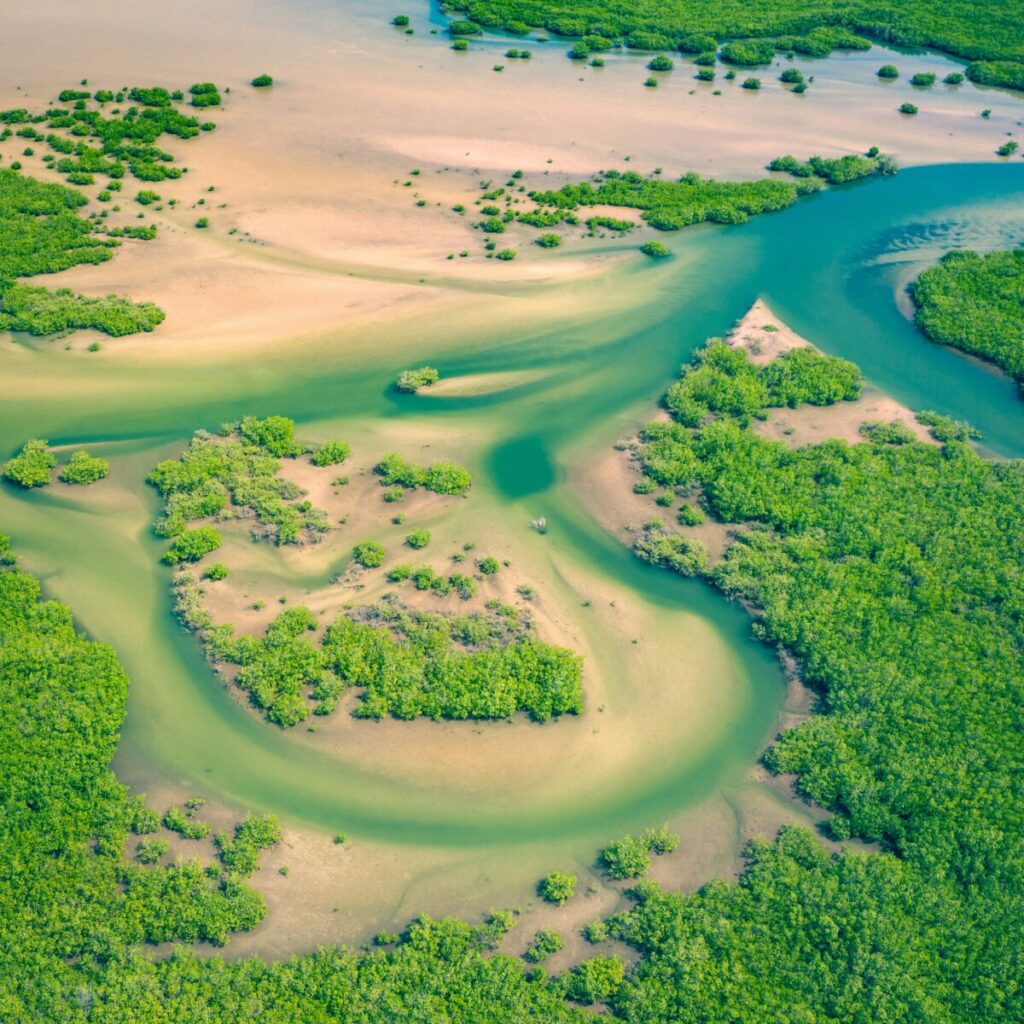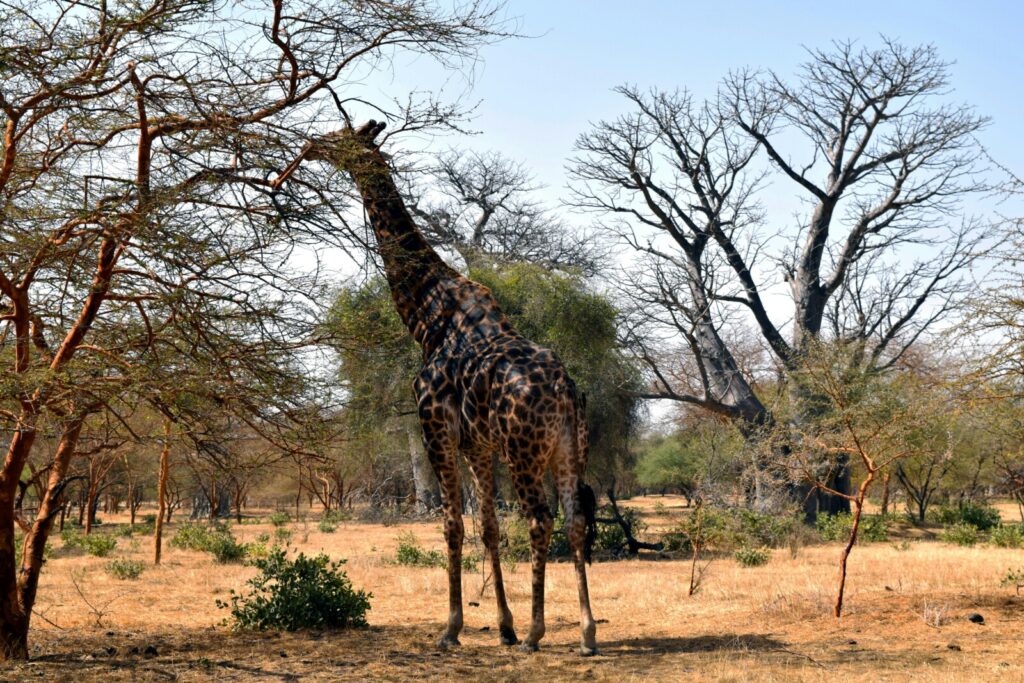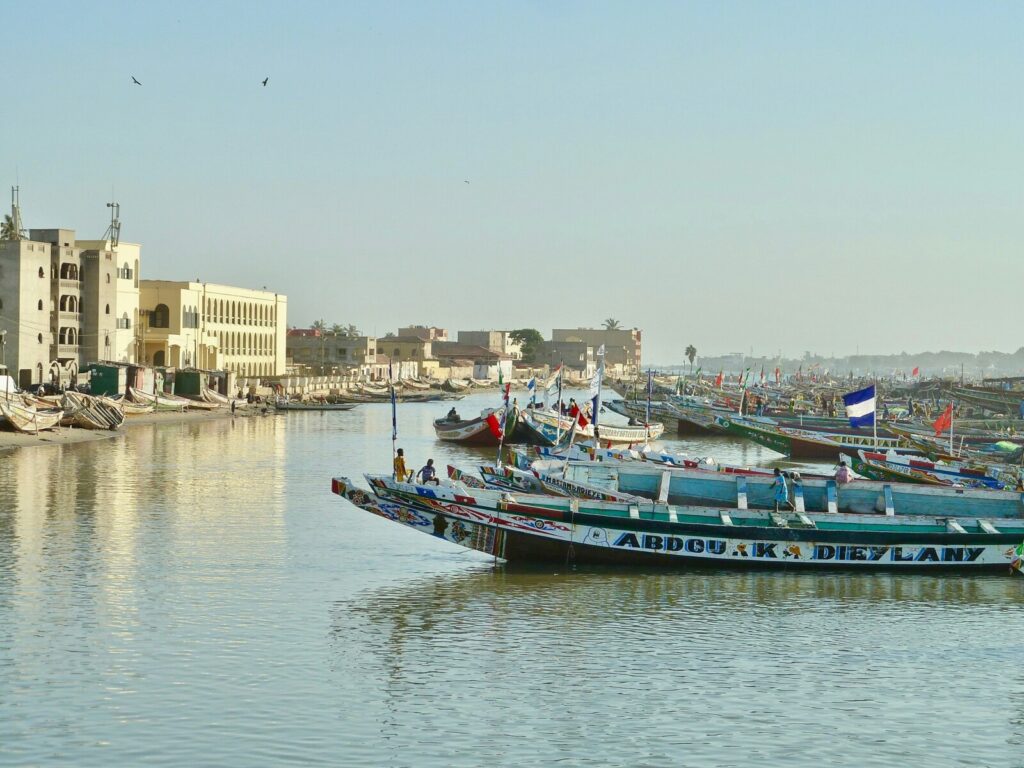Senegal has become one of the top destinations for many participants who choose it for their volunteer experiences.
This country, located on the western coast of Africa, has a rich cultural history and a diverse landscape that ranges from coastal plains to savanna.
That’s why today we want to talk about some tourist attractions you shouldn’t miss if you choose it as your destination for an unforgettable experience.

- DAKAR
Dakar is the capital of Senegal and a lively city where many activities can be enjoyed. This city is a blend of modernity, culture, history, and natural beauty.
One must-see is Gorée Island, which we previously discussed in another blog post, where we covered the most popular places to visit and the history of the slaves linked to this UNESCO World Heritage site.
Other popular spots include:
- Village des Arts: A cultural center where you can meet local artists and view contemporary art exhibitions. Senegalese art is vibrant and diverse, with both traditional and modern influences.
- African Renaissance Monument: Inaugurated in 2010, it is the tallest monument in Africa (49 meters) and symbolizes Africa’s rebirth after centuries of colonization and slavery. The statue represents a family looking toward the future with hope.
- Independence Square: Located in the heart of Dakar, this square is an important meeting point for events and activities, surrounded by historic colonial buildings.
- Marché Sandaga: One of the largest and most vibrant markets in Dakar, where you can find all sorts of products, from textiles, clothing, and crafts to fresh foods and spices. It’s an excellent place to buy souvenirs and experience local life.
- Marché Kermel: This covered market is perfect for those looking for high-quality local products. In addition to fresh foods, there is also a wide variety of crafts.
- Yoff Beach: One of the most popular beaches in Dakar, ideal for relaxing or surfing. It’s also a place frequented by locals for traditional activities like fishing.
- N’Gor Beach: Located near N’Gor Island, it’s perfect for enjoying a beach atmosphere and engaging in water sports. From here, you can take a small boat to visit N’Gor Island, a tranquil refuge off the coast.
- Hann Park: This large urban park is perfect for picnics or strolling. It includes a zoo and a botanical garden, making it ideal for families and those seeking a break from urban life.
- Le Biscuiterie de Médina: One of the best-known live music venues in Dakar, where you can enjoy performances by local and international artists.
- Le Patio: A very popular bar and restaurant in Dakar where you can relax with friends, listen to music, and enjoy local cuisine, trying popular dishes like Thieboudienne (rice with fish, vegetables, and spices), Yassa (marinated chicken in onion and lemon sauce, typically served with rice), or Café Touba (a traditional drink made with Guinea pepper).
- Club Thiossane: Founded by Youssou N’Dour, it’s an iconic venue for enjoying live ‘mbalax’ music, a style that combines traditional African rhythms with modern pop, making it a great option for experiencing authentic Senegalese nightlife.
In Dakar, you can also engage in popular activities such as surfing or attending events and festivals.
- LAKE RETBA (PINK LAKE)
Also known as the Pink Lake, it’s one of the most iconic and surprising destinations. Located about 30 kilometers northeast of Dakar, near the Cape Verde Peninsula, it’s one of the country’s most impressive natural wonders.
The pink color is most pronounced during the dry season (from November to June). This color is caused by a microalga that produces a reddish pigment to absorb sunlight. The higher the salt concentration in the water, the more intense the lake’s pink color. (The lake’s color can vary from light pink to purple, depending on the time of day, the intensity of the sun, and the salt content in the water.)
The lake’s salinity is extremely high, similar to that of the Dead Sea, allowing people to float easily on the water, creating a unique and fun experience. It’s also an important source of salt for the local community, and you’ll see many workers collecting salt from the bottom of the lake, a traditional activity that is crucial for the region’s economy.
Interestingly, this lake was famous for being the final point of the well-known ‘Paris-Dakar Rally,’ which is why many motorsport enthusiasts visit it.
The area surrounding the lake is rich in vegetation and wildlife, and nearby you can find several bird species, including flamingos that sometimes visit the area.
In addition to floating and relaxing in the water, activities include boat rides, visiting the salt mountains, or going on off-road excursions.
- NIOKOLO-KOBA NATIONAL PARK
This UNESCO World Heritage site is one of the most important in West Africa, covering an area of approximately 9,130 square kilometers.
It is home to a great diversity of species. Among the most notable are lions, elephants, buffalo, hippopotamuses, and rarer species like the Derby eland, one of the largest antelopes in the world. It is also home to chimpanzees and Nile crocodiles. Its avifauna is exceptional, with over 330 bird species recorded.
Additionally, the Gambia River runs through the park, providing water to wetlands and swampy areas, a crucial habitat for many aquatic species. The landscapes are varied, offering a visual feast for any visitor.
- SALOUM DELTA AND ITS ISLANDS
This incredible delta, located at the confluence of the Saloum River and the Atlantic Ocean, is a natural reserve that combines mangroves, islands, and forests. It has been designated a Biosphere Reserve by UNESCO.
The delta is made up of mangroves, savanna forests, lagoons, and a vast network of islets formed by sediment deposits and seashells. This area is distinguished by its beaches, channels, and dense mangrove vegetation that covers much of the delta, providing shelter to many species. The islands are known for their surreal landscape, where water intertwines with land, creating a maze of small islets and channels.
We can find dolphins, African manatees, and various bird species such as pelicans, flamingos, and herons. It also has rich marine life and a wide variety of fish and shellfish, vital for the subsistence of local communities. The region is also famous for being a key area for migratory birds. The Saloum Delta National Park is one of the most important sites in Africa for birdwatching.
The Saloum Islands also hold significant cultural importance. Over the centuries, the Serer, a local ethnic group, have created burial mounds and villages on the islands. These mounds, made of seashells, are a testament to the long human occupation of the area and are considered important archaeological sites. The local inhabitants, including fishermen and shellfish gatherers, have developed a culture closely linked to the sea and mangroves. Traditional sustainable fishing practices have been maintained for generations, adapting to the fragile ecosystem of the delta.
Thus, it’s a popular destination for ‘ecotourism,’ allowing you to explore the region in traditional canoes, take boat excursions, practice birdwatching, and visit villages to learn about their traditions.
- SAINT-LOUIS
This city, the former capital of French West Africa, is famous for its colonial architecture and vibrant cultural life. Saint-Louis is another UNESCO World Heritage site, and its music and dance festivals attract tourists from all over the world.
- BANDIA RESERVE
If you don’t have time to visit the large national parks, Bandia Reserve is an excellent option for a safari about 65 kilometers from Dakar, covering an area of 3,500 hectares of forest and savanna. It is located near the town of Saly, in the Thiès region, and is a popular tourist destination for those wishing to experience an African safari without traveling to the larger reserves in Southern Africa.
Although it doesn’t have large predators like lions, the reserve is home to a rich variety of wildlife, including giraffes, white rhinos, zebras, buffalo, gazelles, ostriches, crocodiles, monkeys, hyenas, and various bird species. Many of these animals were reintroduced to Senegal after having disappeared due to hunting and deforestation.

- JOAL-FADIOUTH VILLAGE
This picturesque coastal village features an island made entirely of seashells. It also symbolizes the peaceful coexistence between Christians and Muslims, with its unique mixed cemetery on shells.
Joal and Fadiouth are actually two connected villages, although each has distinctive characteristics.
- Joal
A fishing port located on the Atlantic coast of Senegal, it is the birthplace of Senegal’s first president, Léopold Sédar Senghor, giving it great historical significance in the country. It is primarily engaged in fishing and agriculture and is an important port for Senegal’s fishing industry.
- Fadiouth
Fadiouth is a small island famous for being built almost entirely on a bed of seashells. This includes not only the streets and houses but also the cemetery and other points of interest. The accumulation of shells, a result of centuries of fishing activity, is an iconic feature of the place. The cemetery of Fadiouth is notable for its peaceful coexistence of Christian and Muslim graves, a symbol of religious harmony on the island. It is located on another small island of shells and offers an impressive view over the water.
In Fadiouth, the majority of the population is Christian, while Muslims predominately reside in Joal. Despite these religious differences, both communities live together peacefully, and their festivities are celebrated with mutual respect.
It is common to take guided tours of the village to learn about its history, culture, and way of life. Local guides highlight the importance of the ecosystem and the community’s traditions.
- THE DUNES OF THE LOMPOUL DESERT
If you are interested in the desert, Lompoul is a unique option in Senegal. This small desert will allow you to have an unforgettable experience and enjoy nights under the stars in traditional camps.
- THE MOSQUES OF TOUBA
Touba is the holy city of Islam in Senegal and the center of the Mouride Sufi movement. The Great Mosque of Touba is one of the largest in Africa, an impressive place of devotion with majestic architecture.
The construction of the Great Mosque began in 1926, following the death of Ahmadou Bamba in 1927, and was completed in 1963. It is dedicated to his memory and is the most prominent symbol of the city. Ahmadou Bamba, the founder of Mouridism, is known for his peaceful resistance to French colonialism and his deep spirituality. His teachings are the foundation of the community.
It is a monumental work, with architectural influences from Islamic, Ottoman, and local styles. It is characterized by its imposing central minaret, called Lamp Fall, which measures about 87 meters in height and is one of the tallest in West Africa. The mosque has five minarets and several domes, giving it a distinctive and majestic profile on the horizon of Touba. Inside, the mosque is decorated with finely crafted marble and tiles, featuring spacious areas for prayer. The tomb of Ahmadou Bamba is within the complex and is one of the most visited places, as faithful people come to pay their respects and seek blessings.
Every year, millions of people pilgrimage to Touba to celebrate the Magal, a festival that commemorates Ahmadou Bamba’s exile to Gabon by the French colonial authorities. It is a moment of prayer, reflection, and celebration of faith and Bamba’s peaceful resistance.

This and much more awaits you in Senegal if you decide to make it your destination for a volunteer experience.
We look forward to seeing you!




